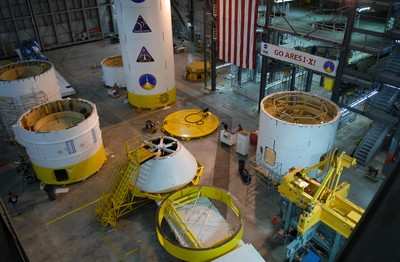Tue, Jun 30, 2009
Vibrations During Launch Might Cause Severe Problems, USAF
Says
 Air Force Officials, who are charged with safety during
launch operations at Kennedy Space Center, are concerned that
harmonic vibrations from the cluster of solid rocket boosters used
on the Ares I-X could knock out both the launch vehicle's Thrust
Vector Control and self destruct mechanism. The result, officials
say, could be extremely dangerous for people living along Florida's
east coast.
Air Force Officials, who are charged with safety during
launch operations at Kennedy Space Center, are concerned that
harmonic vibrations from the cluster of solid rocket boosters used
on the Ares I-X could knock out both the launch vehicle's Thrust
Vector Control and self destruct mechanism. The result, officials
say, could be extremely dangerous for people living along Florida's
east coast.
The concerns may delay or even cancel the planned August 30th
test launch, according to an exclusive report in The Orlando
Sentinel.
While the solid rocket boosters are proven technology, Jon
Cowart, NASA's deputy Ares I-X program manager, told the paper
that "if you change little things, it's amazing the amount of
reanalysis you have to go do. You're not starting from scratch. But
you're not as far down the road as you probably thought you
were."
The Ares-I will eventually carry astronauts back to the moon,
but those missions aren't planned for more than a decade.
Engineers used the same self-destruct mechanism on the Ares I-X
as are used on the shuttle, but the vibrations during launch are
apparently much more severe. According to internal NASA documents
obtained by the paper, the vibrations with enough force to knock
out the self-destruct mechanism could come 60-90 seconds into the
flight, with a TVC failure coming as much as 2 minutes into the
flight. The Air Force requires an assurance that the self-destruct
system will work properly, 99.9 percent, according to Lt. Col.
Loretta Kelemen, head of the Cape Canaveral Air Force Station 45th
Space Wing Range Safety Office. "If they do not meet our
requirements, then they do not launch here."

Cower told the paper he doesn't think the vibrations, which are
called "sympathetic" among the SRB's and could cause the vehicle to
act like a tuning fork, will ever be severe enough to effect either
the Thrust Vector Control or the Flight Termination System. "We've
done our analysis one way. They do it another way."
More News
From 2021: The Inside Skinny On What Being An ANN Oshkosh Stringer Is All About By ANN Senior Stringer Extraordinare, Gene Yarbrough The annual gathering at Oshkosh is a right of p>[...]
Video Showed That During The Takeoff, The Nose Baggage Door Was Open On May 10, 2025, about 0935 eastern daylight time, a Piper PA-32RT-300, N30689, was destroyed when it was invol>[...]
Get The Latest in Aviation News NOW on Instagram Are you on Instagram yet? It's been around for a few years, quietly picking up traction mostly thanks to everybody's new obsession >[...]
"I think what is key, we have offered a bonus to air traffic controllers who are eligible to retire. We are going to pay them a 20% bonus on their salary to stay longer. Don't reti>[...]
Aero Linx: Pilot Briefing The gathering, translation, interpretation, and summarization of weather and aeronautical information into a form usable by the pilot or flight supervisor>[...]
 Oshkosh Memories: An Aero-News Stringer Perspective
Oshkosh Memories: An Aero-News Stringer Perspective NTSB Prelim: Piper PA32RT
NTSB Prelim: Piper PA32RT ANN FAQ: Follow Us On Instagram!
ANN FAQ: Follow Us On Instagram! Aero-News: Quote of the Day (05.28.25)
Aero-News: Quote of the Day (05.28.25) ANN's Daily Aero-Term (05.28.25): Pilot Briefing
ANN's Daily Aero-Term (05.28.25): Pilot Briefing




